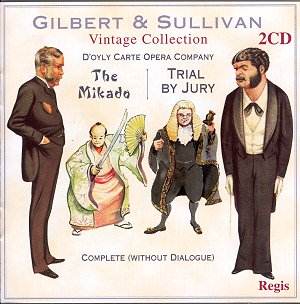GILBERT & SULLIVAN Vintage Collection
The Mikado
Trial by Jury
(complete without dialogue)
 D'Oyly Carte Opera Company
with Chorus and Orchestra conducted by Isidore Godfrey
D'Oyly Carte Opera Company
with Chorus and Orchestra conducted by Isidore Godfrey
(recorded under the direction of Dame Bridget D'Oyly Carte in 1949)
 REGIS RRC 2041 [2 CDs:
116:26]
REGIS RRC 2041 [2 CDs:
116:26]
From your dealer at around £6 per discs

My initial reaction was of great pleasure when listening to such a lively
and authoritative performance of the Overture to The Mikado. But then
I quickly became aware that the recording shows its age - the sound is thin
and wiry - the booklet gives no indication about whether any attempt at
refurbishment was made of the master tapes from which the original (presumably?)
Decca LPs were pressed. For the most part the numbers are taken at a smart
pace. The soloists' lines are usually clear but the choir sounds woolly so
that Gilbert's witty lyrics are practically inaudible.
The D'Oyly Carte G&S performers were very popular in their day and certainly
their enthusiasm and sense of fun comes across very well. The Mikado
numbers comprise all of the first CD and a significant portion of the second.
Leonard Osborn is a dashing, heroic Nanki-Poo with a sly sense of humour
as he demonstrates in 'A Wand'ring Minstrel I'. Martyn Green, so admired
for his patter songs, delights in such well-loved numbers 'As Some Day It
May Happen' with so many people on his list who would not be missed. The
ladies shine too: Margaret Mitchell, Joan Gillingham and Joyce Wright as
Yum-Yum, Pitti-Sing and Peep-Bo in 'Three Little Girls from School'. I was
also impressed with Ella Halman's (Katisha) moving rendition of 'The Hour
of Gladness is Dead and Gone'.
The shorter Trial by Jury (which lampoons lawyers and the English
judicial system in a case of breach of promise) was the first G&S
collaboration, premiered in 1874, in a double bill with Offenbach's La
Périchole. Less well known than The Mikado, it makes a
welcome fill-up to this album. Of the 17 numbers, highlights include: Richard
Watson's hilarious confessions including marrying his mentor's elderly daughter
who "looked forty at dusk with the light behind her" in 'When I, Good Friends,
Was Called to the Bar'; Leslie Rands' outraged Counsel for the Plaintiff
in 'With a Sense of Deep Emotion'; and Leonard Osborn's cad of a defendant
who suggests that if everything in nature changes, then why can't he, in
'Oh, Gentlemen Listen I Pray'?
Irritatingly the numbers, listed on the inside back cover and the back page
of the booklet just have titles, not singers, so those who are unfamiliar
with these works have no real idea who is singing what - a serious omission.
In the final analysis, I have to say that I have enjoyed other recordings
of these works more - for example Sargent's EMI recordings made only a few
years later with such great artists as: Richard Lewis, Elsie Morrison, Marjorie
Thomas, Owen Brannigan, Ian Wallace and Sir Geraint Evans.
Grace Barber

